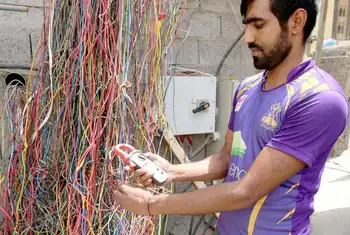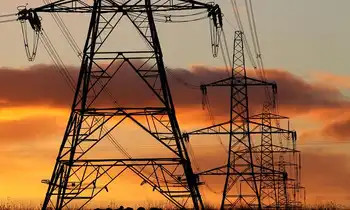Little Done To Prevent Outages, Consultant says
- A local energy consultant has the simple philosophy that energy is the single most important product for progress.
Albert A. Herman, president of A2H Energy Services, makes that assessment based on 28 years' experience working on energy projects in 35 countries.
"I know that energy is the key to making things better in this world," Herman said. "Without it you just don't have anything."
All too many Berks County residents can attest to the latter part of that statement after being without electricity for days during recent wind storms, during the hurricane in late September and during a rare December blizzard a year ago.
Herman credits these power outages with spurring homeowners to install generators.
"It was the December storm of last year that prompted a lot of people to go the route of home generators," Herman said. "While a lot of that has been going on among homeowners, there is really no significant movement in the industry to the installation of on-site power systems."
Herman sees some good sense to restaurants having some type of emergency generators, however.
"Restaurants might want to make sure there is not a loss of refrigerated products during a power outage," Herman said.
Herman said it is estimated that the United States lost $6 billion in productivity during the August blackout and perhaps $500 million of that was in direct losses, such as food products.
Herman blames the inconveniences of recent power outages on one thing -- overgrown trees.
"It's simple ... the power companies have to trim the trees," Herman said.
"In the days when the power companies were regulated, part of the job of the power companies was to trim the trees that affect the distribution lines."
Now since the days of deregulation, the companies have cut back on spending by severely limiting the tree-trimming services they once provided.
"The power companies need to think in a different mindset. A large percentage of their efforts are on the generation side and not on the distribution side. If a particular area continuously loses electricity in every storm, then it's obvious the power company is not spending enough on the distribution system."
Herman said it is essential for residents and businesses to call their power companies to report any branches leaning on the distribution lines.
"All things considered, the United States has done a fairly good job of supplying electricity," he said. "As the cost of electricity increases, however, residents and businesses need to start thinking about conservation."
Herman said people can consider turning down or turning off air conditioning during part of the day in summer and by purchasing the most energy-efficient appliances.
"The problem is that most people just don't care about conserving energy until they get to the point of having to spend about 6 percent of their income on electricity," Herman said. "Although some senior citizens may be to that point, the majority of the population is not.
"And the bottom line is that the government doesn't provide any incentives for making people want to conserve energy."
Related News

Hydro-Québec to Invest $750 Million in Carillon Generating Station
MONTREAL - Hydro-Québec will invest $750 million to refurbish its Carillon generating station, mainly to replace six generating units. The investment also covers the cost of civil engineering work, including making adjustments to water passageways, upgrading electrical equipment and replacing the station roof. Work will start in 2021 and continue until 2027.
Carillon generating station is a run-of-river power plant consisting of 14 generating units with a total installed capacity of 753 MW. Built in the early 1960s, it is a key part of Hydro-Québec's hydroelectric generating fleet. The station is close to the greater Montréal area and feeds power into…




